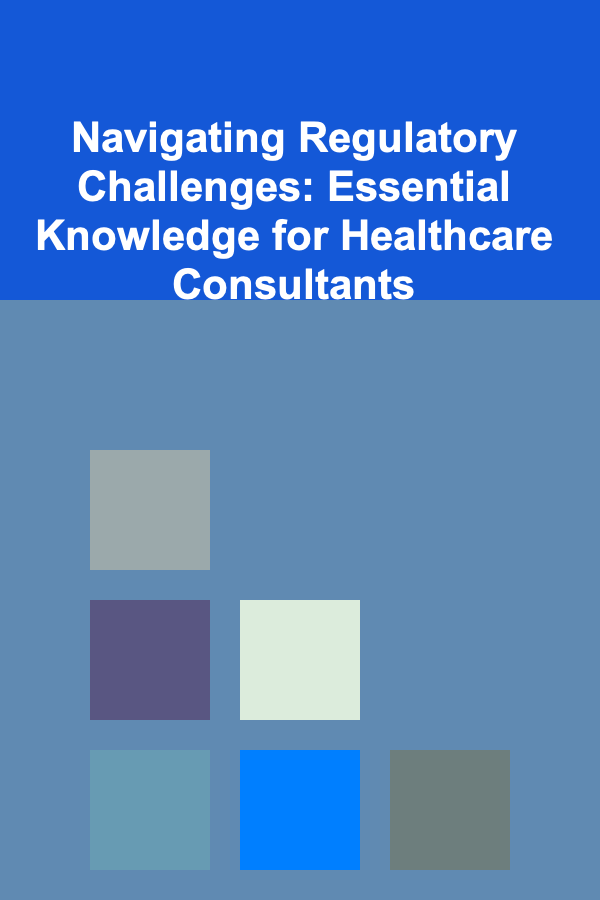
Navigating Regulatory Challenges: Essential Knowledge for Healthcare Consultants
ebook include PDF & Audio bundle (Micro Guide)
$12.99$5.99
Limited Time Offer! Order within the next:

Healthcare consultants are essential in helping organizations navigate the complexities of the healthcare industry. With evolving regulations, healthcare consultants must stay informed of legal requirements and compliance measures that impact healthcare organizations. Regulatory challenges are ever-present, and understanding how to manage these challenges is critical for ensuring operational efficiency, patient safety, and organizational sustainability.
In this article, we'll delve into the key regulatory challenges healthcare consultants face, discuss the importance of compliance, and offer actionable strategies for successfully navigating these obstacles. We will also explore the tools and resources healthcare consultants can utilize to stay ahead in an ever-changing landscape.
The Complexity of Healthcare Regulations
Healthcare regulations are designed to ensure that organizations provide safe, efficient, and effective care to patients. However, the complexity of these regulations can present significant challenges, particularly for those not deeply embedded in the regulatory environment. Healthcare consultants need to be aware of the following regulatory categories that often impact healthcare organizations:
- Federal Regulations: These include laws and policies that affect healthcare systems at the national level. The U.S. Centers for Medicare & Medicaid Services (CMS) is a primary authority in this area, dictating rules for healthcare organizations participating in federal insurance programs.
- State Regulations: Each state may have its own set of laws governing healthcare, covering everything from medical licensure to patient privacy and Medicaid regulations.
- Accreditation and Certification Bodies: Regulatory bodies such as The Joint Commission (TJC) and the National Committee for Quality Assurance (NCQA) set standards for healthcare organizations to ensure quality care and patient safety.
- Healthcare Fraud and Abuse Laws: These include regulations like the False Claims Act, Stark Law, and Anti-Kickback Statute, designed to prevent fraud, waste, and abuse within the healthcare system.
- Privacy and Security Regulations: Laws like the Health Insurance Portability and Accountability Act (HIPAA) safeguard the confidentiality and security of patient information. The increasing use of digital health records and telemedicine has elevated the importance of these regulations.
Navigating these various regulatory landscapes is a multifaceted task for healthcare consultants. Below, we explore actionable strategies and recommendations to help healthcare consultants stay compliant and avoid pitfalls.
Understanding Key Healthcare Regulations
Federal Regulations: Focus on Medicare and Medicaid
Medicare and Medicaid are two of the largest healthcare programs in the United States. These programs affect millions of patients and healthcare providers alike. Consultants working with healthcare organizations must be well-versed in CMS guidelines and changes to ensure compliance and avoid penalties.
Actionable Steps:
- Stay Current on CMS Updates: Federal regulations change frequently. Healthcare consultants should monitor CMS publications, including the Medicare and Medicaid regulations, which can affect everything from reimbursement rates to operational policies. Regularly check the CMS website and subscribe to updates to stay informed.
- Prepare for Audits: Medicare and Medicaid services conduct routine audits of healthcare providers. Consultants can help organizations prepare for these audits by ensuring that the organization's billing practices, clinical practices, and patient documentation comply with federal standards.
State Regulations: Recognizing State-Specific Laws
While federal laws are important, state-level regulations can sometimes be more stringent and specific. States have unique laws governing healthcare delivery, insurance, and patient privacy, among others.
Actionable Steps:
- Collaborate with Legal Experts: Since state laws vary, healthcare consultants should partner with legal teams or specialized healthcare attorneys to interpret and implement state-specific regulations.
- Understand State-Specific Licensing Requirements: For example, healthcare providers must meet specific licensing requirements in different states. Consultants should stay informed about the licensing requirements for different states, particularly when healthcare organizations operate across multiple jurisdictions.
Accreditation Bodies: Achieving Compliance
Accreditation bodies like The Joint Commission (TJC) play a crucial role in setting standards for healthcare organizations. While accreditation is voluntary, failing to meet the standards set by these bodies can result in a loss of reputation or funding.
Actionable Steps:
- Prepare for Accreditation Surveys: Consultants can guide healthcare organizations in preparing for accreditation surveys by ensuring compliance with standards set by organizations like TJC. This involves maintaining high standards in clinical care, infection control, and patient safety protocols.
- Create a Continuous Quality Improvement (CQI) Program: Consultants should recommend implementing a CQI program, which is aligned with accreditation standards. This program can focus on identifying and addressing areas for improvement, which not only boosts accreditation chances but also improves patient outcomes.
Ensuring Compliance with Healthcare Fraud and Abuse Laws
Healthcare fraud and abuse are pervasive problems that pose significant risks to healthcare organizations, both financially and reputationally. Regulations such as the False Claims Act, Stark Law, and Anti-Kickback Statute provide a framework for preventing fraud and abuse.
Actionable Steps:
- Establish a Robust Compliance Program: Healthcare consultants can help organizations implement compliance programs that align with the federal guidelines. This includes educating staff on the importance of avoiding fraudulent activities, such as overbilling, misrepresentation of services, or engaging in improper financial relationships with referral sources.
- Regular Internal Audits: Healthcare organizations should conduct regular internal audits to assess whether their operations are in compliance with fraud and abuse laws. Consultants can facilitate the audit process, identifying high-risk areas, and providing guidance on how to address any potential compliance gaps.
- Train Healthcare Providers: It's essential for healthcare providers to be well-versed in fraud prevention regulations. Healthcare consultants can recommend regular training sessions that cover the legal implications of healthcare fraud, as well as how to identify and prevent unethical practices.
Ensuring Privacy and Security Compliance
With the rise of electronic health records (EHR) and the shift towards telemedicine, the importance of protecting patient data has never been greater. Regulatory frameworks such as HIPAA govern the privacy and security of patient health information.
Actionable Steps:
- Implement Comprehensive Security Measures: Consultants should advise healthcare organizations to invest in the latest cybersecurity technologies and protocols to protect patient data. This may include encrypted communication systems, secure cloud storage, and firewalls to prevent unauthorized access.
- Conduct Regular Risk Assessments: Healthcare organizations should conduct periodic risk assessments to evaluate the effectiveness of their privacy and security measures. Consultants can help with this by identifying vulnerabilities and recommending corrective actions.
- Train Staff on Privacy Protocols: It's essential for all healthcare staff to be well-versed in HIPAA regulations and other privacy protocols. Healthcare consultants should recommend that healthcare organizations offer mandatory privacy and security training for all staff members to ensure that they are up-to-date on best practices for protecting patient information.
Managing Regulatory Risk in Telemedicine
Telemedicine has become an essential tool in modern healthcare, especially during the COVID-19 pandemic. However, telehealth regulations are still evolving, creating uncertainty for healthcare providers and consultants alike.
Actionable Steps:
- Stay Abreast of Telemedicine Regulations: Healthcare consultants should monitor changes in telemedicine regulations, especially concerning licensure, reimbursement, and privacy concerns. As telemedicine rules continue to evolve, it's essential to ensure that organizations are compliant with state and federal guidelines.
- Ensure Reimbursement Compliance: Medicare and private insurance plans have specific rules around telemedicine reimbursement. Consultants should help healthcare organizations understand the reimbursement landscape and ensure that telehealth services are appropriately coded and billed.
- Cross-Jurisdictional Issues: Telemedicine often involves cross-state practice, which can complicate licensure requirements. Consultants should guide healthcare organizations in navigating these licensure challenges and ensure that providers comply with state-specific rules for delivering telehealth services.
Effective Use of Technology to Ensure Regulatory Compliance
Technology plays a crucial role in ensuring regulatory compliance in healthcare. Healthcare consultants can leverage various tools and software solutions to streamline regulatory processes and maintain compliance more efficiently.
Actionable Steps:
- Implement Compliance Management Software: Compliance management systems can help healthcare organizations stay organized by tracking regulatory requirements, audit trails, and compliance-related tasks. Consultants should recommend such tools to streamline compliance management.
- Utilize Data Analytics for Risk Management: Healthcare organizations can use data analytics to identify trends, assess risks, and proactively address compliance issues. Consultants can assist organizations in using analytics tools to track performance against regulatory benchmarks and improve compliance outcomes.
- Adopt Electronic Health Records (EHR): EHR systems are vital for maintaining compliance with privacy laws such as HIPAA. Consultants can help healthcare organizations implement and optimize EHR systems that adhere to regulatory standards and ensure that patient information is securely stored.
Adapting to Changing Regulatory Environments
Regulatory changes are inevitable, and healthcare consultants must be flexible and proactive in responding to these changes. By staying informed and prepared, consultants can help organizations avoid compliance pitfalls and ensure continued success in the ever-evolving healthcare landscape.
Actionable Steps:
- Monitor Legislative Changes: Healthcare consultants should regularly monitor local, state, and federal legislative activities. Tools like government websites, regulatory agencies, and professional organizations can provide valuable insights into upcoming regulations that could affect healthcare organizations.
- Build a Regulatory Watch System: Setting up a system for tracking regulatory changes ensures that healthcare organizations are always prepared for new rules and policies. Consultants can help create such a system to ensure that changes are quickly integrated into daily operations.
- Foster a Culture of Compliance: To ensure that an organization adapts to new regulations smoothly, consultants should foster a culture of compliance within the organization. This involves cultivating an environment where staff are regularly trained, informed, and engaged in upholding regulatory standards.
Conclusion
Navigating regulatory challenges in healthcare is a complex but crucial task for healthcare consultants. By understanding the regulatory landscape, advising healthcare organizations on compliance, and utilizing technology and data, consultants can mitigate risks and support organizations in providing high-quality care. The key to success lies in staying informed, being adaptable, and fostering a culture of compliance throughout the organization.
In an ever-changing regulatory environment, healthcare consultants have the opportunity to help organizations not only comply with regulations but also improve operational efficiency, reduce legal risk, and ultimately provide better care for patients.

How to Build a Baby Feeding Schedule: Essential Tools and Products
Read More
How to Sell Vintage Clothing on Depop: A Comprehensive Actionable Guide
Read More
How to Use Budget-Friendly Rugs to Tie a Room Together
Read More
How To Build a Positive Relationship with Your Child's School
Read More
Understanding Quantum Cloud Services
Read More
How to Craft Compelling Press Releases That Get Noticed
Read MoreOther Products

How to Build a Baby Feeding Schedule: Essential Tools and Products
Read More
How to Sell Vintage Clothing on Depop: A Comprehensive Actionable Guide
Read More
How to Use Budget-Friendly Rugs to Tie a Room Together
Read More
How To Build a Positive Relationship with Your Child's School
Read More
Understanding Quantum Cloud Services
Read More